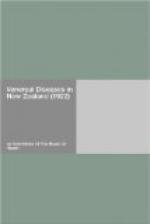Among the witnesses questioned on this subject there was an overwhelming preponderance of opinion that the time had now arrived for the adoption of notification of all cases of venereal disease by number or symbol, if only for the purpose of getting more accurate statistics; the notification by name of those recalcitrant patients who refused to continue treatment until cured; and compulsory examination of those whom the Director-General of Health had good grounds for believing to be suffering from the disease and likely to communicate it to others, and who refused to produce a medical certificate as to their condition. Only three medical men expressed themselves as being against these proposals. On the other hand, the lady doctors examined (two of them members of the National Council of Women, and the third representing the Young Women’s Christian Association) gave evidence in favour of conditional notification, and compulsory examination, and compulsory treatment of recalcitrants. It should be added that all the witnesses who were engaged in rescue work, or other work bringing them face to face with the horrors of venereal disease, were most emphatic in their opinion that compulsory notification and treatment should be adopted.
It is noteworthy that when the notification of ordinary infectious disease was first proposed in England almost exactly the same arguments were brought against the proposal as are now advanced against the notification of venereal disease. Sir W. Foster, member for Ilkeston, and a medical man of standing, speaking in the House of Commons in the debate on the Infectious Diseases Notification Bill, on the 31st July, 1889, said,
“The Bill calls upon medical men to perform something more than the ordinary duties of citizenship by requiring them to become informers of the occurrence of diseases. The relation of a medical men to his patient ought to be one of complete confidence, and anything that comes to the knowledge of a medical man in the practice of his profession is practically an inviolable secret; and I do not like any Bill to interfere with that relationship. I know myself that one of the results of this Bill, if passed into law, will be that in scores of cases medical men will not be called in to attend people suffering from infectious diseases ... I admit the difficulty of the position, but I am anxious that no measure should pass into law which will induce the public to keep these diseases more secret than they have been in the past, with the risk of adding to the spreading of them. We must be very cautious not to do anything which will prevent the public from placing full and implicit confidence in their medical man. I can quite conceive it to be possible that, if an outbreak of infectious disease occurs in a populous part of London, the people may, in order to prevent exposure, refuse to allow a medical man to come in, and in such cases we shall have tenfold more difficulty than at present. Therefore, while I am anxious to promote the notification of disease, I do not want the Government to promote rebellion on the part of the public.”




